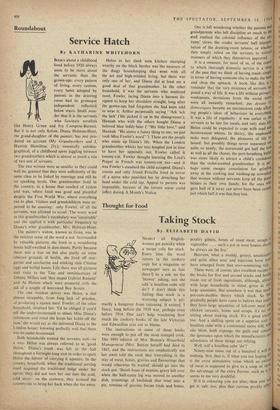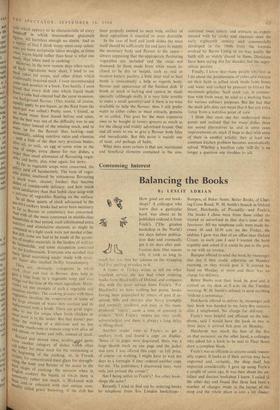Thought for Food
Taking Stock
By ELIZABETH DAVID
and Edwardian eras are to blame.
The instructions in some of these books were enough to put off the most intrepid cook. The 1891 edition of Mrs. Beeton's Household Management (Mrs. Beetori herself had died in 1865, and the instructions are emphatically not her own) told the cook that 'everything in the Way of meat, bones, gravies and flavourings that would otherwise be wasted' should go into the stock-pot. 'Shank-bone of mutton, gravy left over when the half-eaten leg was moved to another dish, trimmings of beefsteak that went into a pie, remains of gravies, bacon rinds and bones, madly a hangover fancy, long before before 1914. One much the cookery poultry giblets, bones of roast meat, sera! vegetables . . . such a pot in most houses sl be always on the fire.' Heavens, what a muddy, greasy, unattra ctive and quite often sour and injurious brew 051 have emerged from that ever-simmering tub.. There were, of course, also excellent recipes le the books for first and second stocks and brottli made out of fresh ingredients, although, al 010 with large households in mind, given in ye° large quantities. But somehow it was that stock' pot-cum-dustbin theory which stuck. So th31 gradually people have come to believe that t they have large quantities of left-over meatarid chicken carcases, bones and scraps, it's no Ilsc, setting about making stock. It's a good exctS'i
c
too. And a shilling spent on a superior sort et bouillon cube with a continental name will, with, die blow, both expunge, the guilt and co fleceA‘ the ignorance upon which the manufacturers advertisers of -these things are relying.
Well, will a bouillon cube 'do'?
Ninety-nine times out of a hundred it,w nothing. Not, that is, if what you are hopir is the extra stimulative value which an c of meat is supposed to give to a soup or the advantage of the extra flavour, such as seems to me very doubtful.
If it is colouring you are after, then yoi get it; salt, too; plus that curious prickly
s of
000 I wio :titer taste which appears to be characteristic of every foOdituff in which monosodium glutamate figitres. All harmless enough no doubt. And as a 4,1tittCr or fact I think many meat-soup substi- tote.dre more acceptable taken straight, at times "hen'Warm liquid rather than food is what one heed,. than when used in cooking: However, in the now remote days when nearly all bask ingredients were short. I used to use thee Cubes for soups, and other dishes which traditionally required stock. I even recommended sonic such product in a book. Too hastily. I soon found that every dish into which liquid made from. a cube had entered had the same monoton- ous background flavour. (This would, of course, equally apply to pot-liquor, as the fluid from the '`°"-Pot was called.) Pretty soon, 1 found, as tio doubt many have found before and since, that the.best way out of the difficulty was to use P.lain water instead of the missing stock, and to 111, ake 'up for the flavour thus lacking-- and. meidenitolY, adding nutritive value and vitamins with a little of the then very precious butter, olive oil, or milk, an egg or some wine in the as.e of soups; .extra cheese for rice dishes, a arger than usual allowance of flavouring veget- ables and herbs, plus wine again, for stews. far as vegetable soups were concerned, the 1""eY Paid' off handsomely. The taste of yew- ,Puides unaltered by extraneous flavouring is much truer, cleaner, fresher;. they become dishes of considerable delicacy; and how much rnciri satisfactory than that feeble clear soup with a iftlienne of vegetables floating on the surface. So all those quarts of stock advocated in the Pre-1914 cookery books had never been necessary ,, -.As far as flavour or consistency was concerned. nd With all the meat consumed in middle-class households at that period, such infinitesimal extra utritive and stimulative elements as might be `81)mained in a light stock were not needed either. Still, some use had to be made of the o lut tianti- d-n s,°r surplus materials in the larders of NVCII-to- c h, and some occupation contrived tior the kitehenmaids. Everyone was satisfied that h ese 'good nourishing soups' made with stock- liquor also implied thrifty housekeeping There are, obviously. e%ceptions in wh:ch Stock clear and true in flavour, does help Jo 11, lye little body to a vegetable soup and' also rbrings out the taste of the main ingredient. Mush- t9°Ms are one example of such a vegetable and
v"latoes another. The cooking process with these
replacement large amount the involves the evaporation of 'sOrTIC of of water they contain and its 41e.placement with a broth. These are good veget-
:es to use for soups when fresh chicken or
ecat stock is in the larder. But that doesn't pre- v""de the making of a delicious and no less
.411-lable mushroom or tomato soup with olive oil
and cheese, or butter and milk, instead of stock. 1._ Braised and stewed meat, poultryA9d game c7m another category of dishes WIllrch often 4'1 either for meat stock for the moistening at 01 r e. beginning of the cooking, or, in French ,‘L.s, for concentrated meat glaze for strength- tn'img the body and flavour of the sauce in the „ntill stages of cooking— the moment when in nglish cookery the liquid, of v■hich there is eo nmlonly rather too much, is -"Chickened with no ill lir. and/or coloured with that unique corn- Called gravy browning. If the dish has been properly cooked to start with, neither of these operations is essential or even desirable.
In the case of beef and lamb dishes the meat itself should be sufficiently fat and juicy to supply ' the necessary body and flavour to the sauce— always supposing that the.appropriate flavouring vegetables are included and the meat not drowned. In those made from white meats in- clined to be dry or insipid, such as veal or modern battery poultry, a little clear veal or beef broth is undoubtedly a help as regards body. flavour and appearance of the finished dish. If broth or stock is lacking and cannot be made specially (although really it is very little trouble to make a small quantity) and if there is no wine available to help the flavour, then I still prefer water to either cubes or meat extracts, genuine or so called. This goes for the most expensive ones to be bought at luxury grocers as much as for the cheap and widely advertised brands. One and all seem to me to give a flavour both false and ineradicable. But this point is mainly one of taste, and perhaps of habit.
What does seem certain is that any nutritional and beneficial elements contained in the con- centrated meat tablets and extracts as experi- mented with by cooks and chemists since the. early eighteenth century and commercially developed in the •1860s from the formula evolved by Baron I.iebig in no way justify the 'faith still so widely•placcd in them. Dieticians have been saying this .fpr decades, but the super- stition persists.
Finally. I know that many people %%lip' feel as I do about the pointlessness of cubes and extracts set their faith in jellied stock made from bones and water and cooked by pressure to extract the. maximum gelatine. Such stock can, in conjunc- tion with fresh meat, be used as a working basis for various culinary purposes. But' the fact that the stock jells does not mean that it has any extra virtue from a nutritive point of view.
I think that once one has understood these points and realised that for many' dishes there are sound alternatives to. and in some cases improvements on, stock fl hope to deal with sonic of them in another article), then at least one common kitchen problem becomes automaticall■ solved. Whether a bouillon cube 'will do' is no longer a question one troubles to ask.



































 Previous page
Previous page